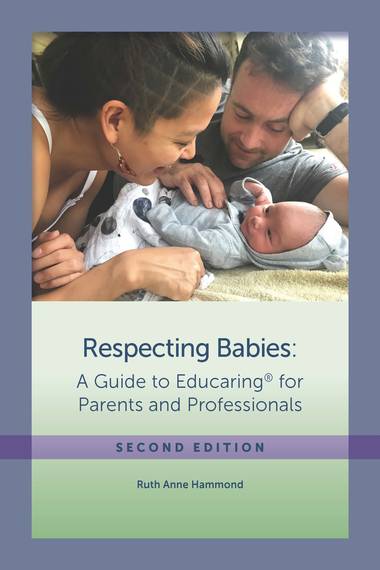Respecting Babies and Young Children
What is the best child care in an individualistic, industrialized society?
Ruth Anne Hammond, in her new book, Respecting Babies: A Guide to Educaring for Parents and Professionals, 2nd ed., discusses the method of caring for young children coined by the infant-toddler professional Resources for Infant Educarers (RIE). It is a compendium of thoughtful, detailed ideas based in wisdom from ZeroToThree and Magda Gerber (founder of RIE). RIE and Hammond’s presentation may be the best method for approaching child-raising in the modern industrialized world that emphasizes individualism.
The book is full of principles but also concrete examples of how to treat young children in particular situations. From routines to language and literacy, discipline, play, and movement, the book is a rich advisory for parents of young children.
Here are a few of the many topics covered.
Consistency
As a species, existing millions of years to this point, routines were determined by the natural world (e.g., sunrise, sunset) and the band’s physiological energetic directions. In industrialized societies today, the rhythms of nature, whether weather or physiological needs, are secondary to the expectations of work hours.
In our ancestral context, consistency was provided by the evolved nest (for babies: constant carrying, breastfeeding on request, a village of caregivers). Living outdoors in the natural world also provided a routine. In lands in tropical areas, where most lived, the sun came up at 6 and set at 6. With the changing content of breastmilk also assisting (sleep-inducing hormones in the evening and energizing ingredients in the morning), a child’s circadian rhythms were easy to establish. Moreover, everyone slept together in one way or another, with four-hour phases separated by middle-of-the-night activities. Daytime had a slow-paced rhythm better suited to the slow pace that babies prefer.
Sleep problems today are linked to lights and screens on in the evening, separate sleeping spaces, lack of sufficient physical activity (rough and tumble play) during the day, and decreased direct breastfeeding in the evening and at night. Of course, long work hours and health problems, such as high levels of anxiety in modern societies, also play a role in making it hard to wind down, relax and sleep. When individuals are stressed, predictability helps them cope. Consequently, to help babies learn a rhythm of life in the busy modern world, schedule consistency is very helpful.
In the first year of life, one of the fundamental building blocks of life is being established: basic trust (or distrust) of living is shaped by the regularly repeated experiences a child has (Erikson, 1950). RIE emphasizes “‘round the clock routines.” According to the founder, Magda Gerber, infants thrive on “boring sameness.” Ruth Anne Hammond, in discussing the RIE method of child-caring (educaring), notes that “babies need predictability and regularity in their lives more than they need excitement and stimulation” (p. 29). Adjusting to the pace of the infant, caregivers “will allow the baby to learn and grow peacefully and at the tempo that supports her ability to stay I tune with herself and what is around her” (ibid).
Adjusting to the Baby
Child care workers in RIE (educarers) ask these kinds of questions to learn about the baby, to tailor their care appropriately. The assumption is that parents have spent the necessary time in the first few months to learn the answers.
- How do you know when she is sleepy?
- How does she most often fall asleep in the daytime?
- How does she wake up?
- What usually happens first when she wakes up?
- When does she like to play?
- Is she happy to play on her own?
- How do you know when she is getting tired, is hungry, is full?
- How does she let you know she needs changing?
There are a lot of signals to learn and follow, unique to each child. Following the infant’s rhythms in the early months helps the child begin to develop self-regulation.
Respecting Babies During Routines: Diapering
Hammond writes that one of the most potentially delightful times with baby is during diaper changing. When the adult moves slowly enough, the adult can talk through each step, waiting for the infant to respond (e.g., can you lower your leg…?). The infant can come to feel a sense of “participatory control” (p. 34).
“Waiting for a baby sends the message that she is very important and that what she is doing is very important. Creating space for cooperationlays the ground work for more mature and complex interactions later. The patience being modeled by the adult may help her be willing to wait when adults have to take care of their business. Mutual respect is built this way.” (p. 34)
Pointing out her experience with her son, she says “A good diaper change is a great tool for mutual emotional refueling” (p. 35).
Attentiveness and Observation
The RIE approach is infused with respecting children by sitting back and observing them during solo play and not interfering during social play with other children (keeping children safe while they work out conflicts). In its parent-infant classes, RIE has parents stop talking and sit back and watch their babies interact for 20 minutes. Parents are amazed at how vibrant and smart their children are. See here for an RIE video.
Overall, RIE comes off very well in comparison to other early child care approaches in meeting children’s basic needs (Kurth & Narvaez, 2018).
More on the RIE approach: How to Respect a Baby Through Positive Touch
REFERENCES
Erikson, E. H. (1950). Childhood and society. New York: Norton.
Hammond, Ruth Anne (2019). Respecting babies: A guide to educaring® for parents and professionals, 2nd ed.. Washington, D.C.: Zero to Three.
Kurth, Angela, & Narvaez, Darcia (2018). The evolved developmental niche and children’s developing morality. In J. Delafield-Butt, A-W. Dunlop & C. Trevarthen (Eds.), The Child’s Curriculum: Working with the natural values of young children (pp. 104-125). Oxford: Oxford University Press.


